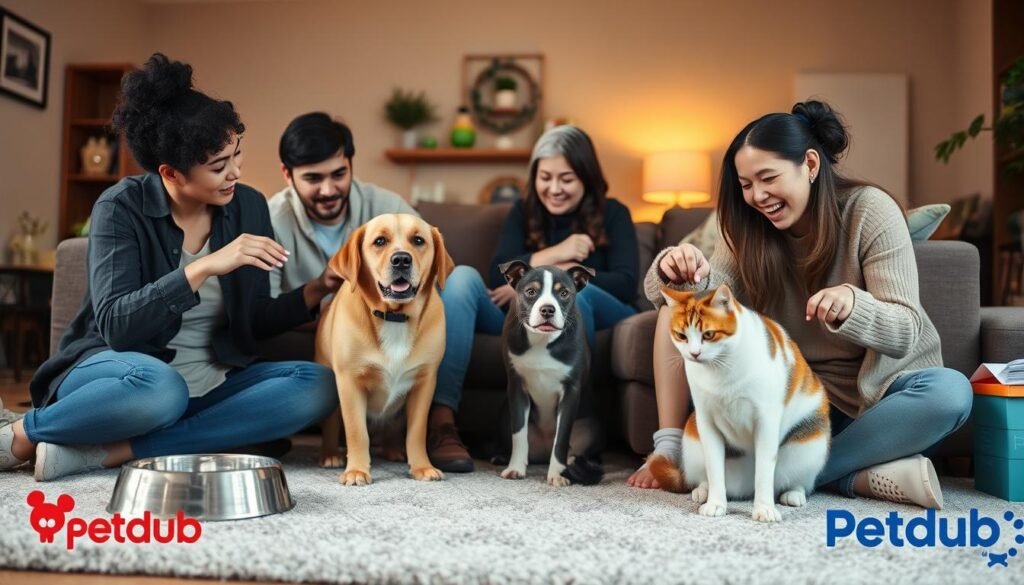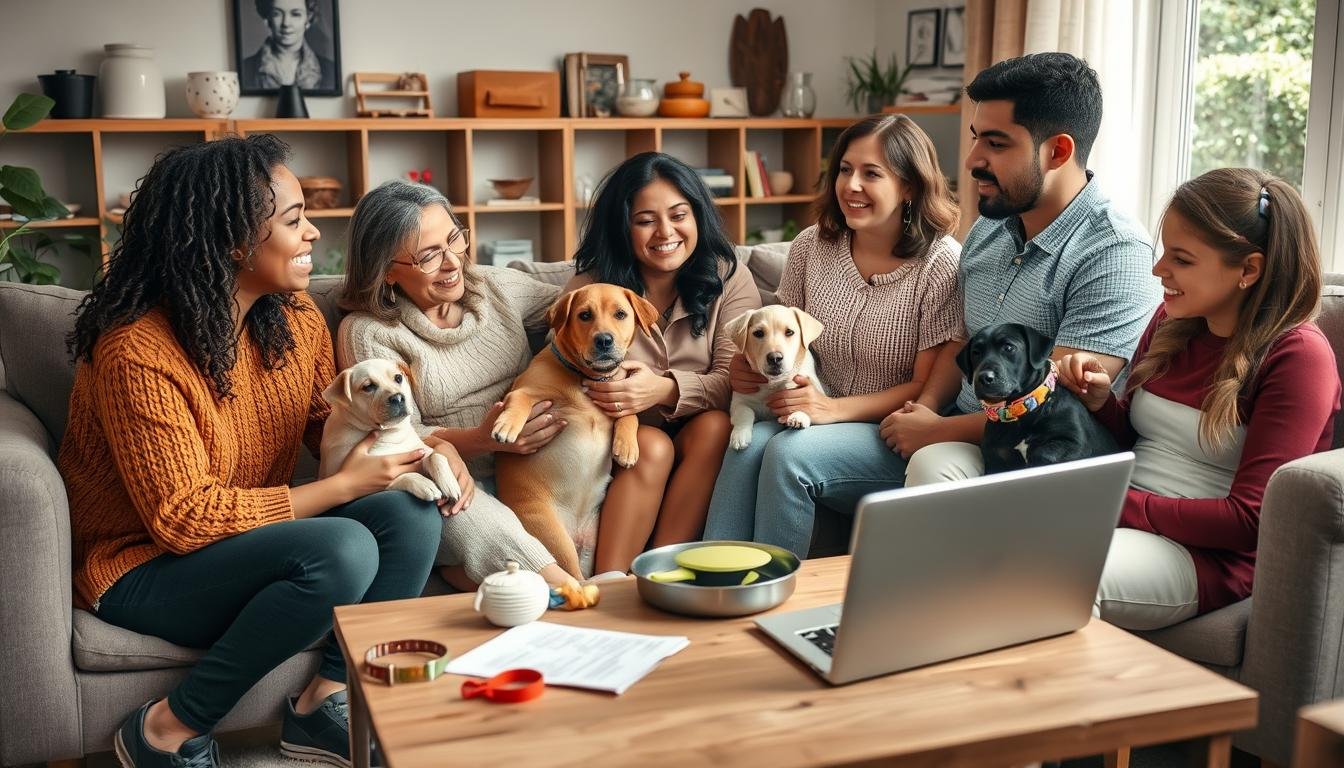Did you know that nearly 3.1 million dogs and 3.2 million cats enter animal shelters in the United States each year? Adopting a pet is a big decision. It’s a long-term commitment that needs careful thought and preparation. In this guide, we’ll talk about why knowing what you’re getting into is key. This ensures a happy and rewarding life for both you and your new pet.
Key Takeaways
- Understanding the responsibilities and commitment involved in pet ownership
- Researching reputable animal shelters and rescue organizations
- Evaluating your lifestyle and living situation to ensure a good fit
- Preparing for the financial responsibilities of pet ownership
- Educating yourself on the specific breed characteristics and care requirements
Understanding the Importance of Informed Animal Adoption
Bringing a new pet home is exciting and rewarding. But, it’s important to be well-prepared and caring. Adopting a pet is a big commitment that needs a lot of understanding. By learning and preparing, we can make sure our pet journey is successful and happy for both us and our pet.
Why Preparation Matters for a Successful Pet Ownership Journey
Deciding to adopt a pet is a big choice. Each pet has its own needs and personality. By learning about these, we can create a happy home for our pet. Being a responsible pet owner is key to a lifetime of happiness and companionship.
Avoiding Impulsive Decisions and Potential Regrets
- Impulsive choices can lead to problems, like pets being returned to shelters. This happens when our expectations don’t match the pet’s needs.
- By thinking carefully about our lifestyle and home, we can avoid regrets. This makes the transition smoother for both our family and the pet.
- Adopting a pet with knowledge is good for the pet and for us. It builds a strong bond and a rewarding experience.
Remember, adopting a pet with knowledge is crucial for responsible pet ownership and animal welfare. By focusing on preparation and understanding the commitment, we can create a happy and fulfilling life with our new pet.
Researching Reputable Animal Shelters and Rescue Organizations
Choosing the right animal shelter or rescue organization is key when adopting a pet. These places are crucial for the welfare of animals and a successful adoption. It’s important to find organizations that care deeply about the animals they help.
Animal shelters and rescue groups vary, from local non-profits to big nationwide networks. To find the best one for you, consider a few things:
- Reputation and accreditation: Look for shelters and rescues known for their ethics, positive reviews, and respected accreditations.
- Animal welfare standards: Make sure they follow best practices in housing, vet care, behavior assessment, and adoption.
- Transparency and communication: Choose places that are open about their work, share detailed animal info, and support adopters.
- Adoption counseling: A good organization will understand your lifestyle and help find the perfect animal for you.
| Shelter or Rescue Organization | Reputation | Animal Welfare Standards | Adoption Counseling |
|---|---|---|---|
| PawsomeRescue | Highly Recommended | Excellent | Comprehensive |
| City Humane Society | Good | Satisfactory | Basic |
| Paws for a Cause | Excellent | Outstanding | Exceptional |
By carefully researching and comparing different animal shelters and rescue groups, you can find the perfect match for your pet adoption. This ensures your new pet gets the best care and support.

Evaluating Your Lifestyle and Living Situation
Before getting a pet, it’s important to check if your lifestyle fits the pet’s needs. This step is key for a happy life with your new furry friend.
Assessing Your Time Commitment and Availability
Pets need a lot of time for feeding, exercise, grooming, and play. Look at your schedule to see if you can give your pet the care it needs. Think about your work, travel, and other duties that might affect your pet’s care.
Considering Your Living Space and Housing Conditions
The size of your home matters when choosing a pet. Make sure your home has enough space for your pet’s needs. Also, check if there are any rules about pets in your area.
By checking your lifestyle and home, you can choose the right pet. This ensures a happy and lasting bond with your new pet.
“The decision to welcome a pet into your home should not be taken lightly. Carefully evaluating your lifestyle and living situation is the first step towards ensuring a successful and fulfilling pet ownership journey.”
Preparing for the Financial Responsibilities of Pet Ownership
Being a responsible pet owner means more than just the joy of having a pet. It’s important to know the costs of caring for a pet for its whole life. We’ll help you plan for the costs of getting and keeping a pet, including medical bills.
Budgeting for Initial and Ongoing Costs
Getting a pet comes with many costs at first, like adoption fees and vaccinations. You’ll also need to buy food bowls, leashes, and toys. These costs can add up quickly, so it’s key to plan ahead. Don’t forget to include monthly costs for food, grooming, and vet visits in your budget.
Understanding the Potential Medical Expenses
Pets can get sick or hurt unexpectedly, and vet care is expensive. It’s crucial to be ready for these medical expenses. Save money for emergency vet visits and plan for any health issues your pet might have. This way, your pet can get the care they need without breaking the bank.
| Initial Costs | Ongoing Costs | Potential Medical Expenses |
|---|---|---|
| Adoption fee | Food | Routine check-ups |
| Vaccinations | Grooming | Preventive care |
| Spaying/Neutering | Supplies (e.g., toys, bedding) | Illness or injury treatment |
| Essential supplies | Veterinary visits | Emergency care |
Knowing the financial side of pet ownership helps you make a smart choice. It ensures your pet gets the care and love they deserve for their whole life.

Informed Animal Adoption: Exploring Breed Characteristics
Adopting a new pet means learning about the breed or species. This knowledge helps make sure you and your pet will get along well. We’re committed to informed animal adoption, so we’ll look at size, energy, and grooming needs.
Researching Size, Energy Levels, and Grooming Requirements
The size of your pet affects your home and daily life. Big pets need more space, while small ones might fit better in apartments. It’s important to check if your home and lifestyle match your pet’s needs.
Knowing your pet’s energy level is also key. Some pets are happy with little activity, while others need lots of play. Choosing a pet that matches your energy helps avoid problems and ensures a good bond.
Grooming needs are another thing to think about. Some pets need a lot of brushing, baths, and grooming to look good. Make sure you can handle these pet care education tasks before adopting.
By researching these breed traits, you can make a better choice. This choice should fit your lifestyle and preferences. Knowing this can make your pet experience rewarding and enjoyable.
| Breed Characteristic | Low | Medium | High |
|---|---|---|---|
| Size | Small (under 20 lbs) | Medium (20-50 lbs) | Large (over 50 lbs) |
| Energy Level | Calm, Relaxed | Moderate, Playful | High, Active |
| Grooming Needs | Minimal, Short-haired | Regular Brushing | Frequent Grooming, Long-haired |
“Adopting a pet is a long-term commitment, and understanding the breed characteristics is crucial for ensuring a successful and rewarding experience for both you and your furry friend.”
Educating Yourself on Pet Care and Training Requirements
As pet owners, we must give our furry friends the best care. This means learning about their needs. Whether it’s a dog, cat, or exotic pet, knowing their unique needs is key.
Before bringing your pet home, research their care basics. Learn about their diet, exercise, grooming, and health needs. This knowledge helps us support our pets and live in harmony.
Training for a Well-Behaved Pet
Training is also crucial for a well-behaved pet. It helps them adjust to your home and strengthens your bond. Positive training methods teach important skills like obedience and tricks.
- Enroll in training classes or work with a certified animal behaviorist to develop a tailored training plan for your pet.
- Consistently practice training exercises at home, using rewards and praise to reinforce good behavior.
- Be patient and persistent, as training takes time and consistency to yield results.
By focusing on pet care education and training, we create a caring environment. This leads to a fulfilling pet ownership experience for years.

“The greatness of a nation and its moral progress can be judged by the way its animals are treated.” – Mahatma Gandhi
| Veterinary Care Essentials | Recommended Frequency |
|---|---|
| Routine Check-ups | Annually |
| Vaccinations | Annually |
| Dental Cleanings | Annually |
| Flea/Tick/Heartworm Prevention | Monthly |
Considering the Age and Temperament of the Animal
Adopting a new pet is a big decision. You must think about the animal’s age and temperament. These things help you create a loving home for your pet.
Assessing Your Ability to Handle Different Behavioral Needs
Adopting an animal is a long-term promise. Knowing if you can handle different behaviors is key. Pet compatibility assessment is very important during adoption.
- Puppies and kittens need lots of training and socializing. Older pets have routines you should respect.
- High-energy dogs like huskies need lots of exercise. Cats or small dogs are better for a quiet life.
- Some pets, like reptiles, need special care. This might not fit your responsible pet ownership skills.
Think about your life, lifestyle, and if you can meet your pet’s needs. This post-adoption support helps you and your pet have a great relationship.
“The key to a successful pet adoption is finding the perfect match between the animal’s personality and your own.”
By carefully looking at the animal’s age and temperament, you make a smart choice. This choice leads to a lifetime of responsible pet ownership and love.
Involving the Entire Family in the Adoption Process
Adopting a new pet is exciting and changes your household. It’s key to make sure the whole family is ready and involved. The success of the adoption depends on everyone’s support and teamwork.
Ensuring a Smooth Transition for All Members
Welcoming a new pet into your home needs a harmonious environment. Involve everyone in choosing the right pet and planning its care.
To make the transition smooth, follow these steps:
- Have a family meeting to talk about adopting a pet. Let everyone share their thoughts and expectations.
- Give each family member a pet care task. This makes everyone feel responsible for the pet’s well-being.
- Provide educational materials for family members, especially kids, on pet care.
- Set clear rules for the pet’s behavior. Make sure everyone agrees on these rules.
- Have regular meetings to talk about any issues or concerns.
Working together in the adoption process helps everyone adjust smoothly. This sets the stage for a successful and responsible pet ownership experience.

“Adopting a pet is a family affair. Involving everyone in the process ensures a harmonious and supportive environment for the new addition to your household.”
Remember, post-adoption support is key for the pet and family’s well-being. By working together, you can smoothly add your new furry friend to your daily life.
Preparing Your Home for a New Pet
Welcoming a new pet into your home is exciting. But first, make sure your home is ready. It should be safe and comfy for your new friend. We’ll show you how to get your home ready for a happy pet.
Childproof Your Home
If you have kids, keep your pet safe. Cover electrical cords and sharp edges. Choose furniture and decorations that won’t harm your pet.
Establish a Dedicated Space
Make a special spot for your pet. It could be a cozy corner or a room. Make sure it has everything your pet needs, like food bowls and toys.
Provide Ample Enrichment
- Give your pet fun toys and puzzles to keep them busy.
- Provide scratching posts and climbing spots for natural behavior.
- Make sure they get sunlight and a comfy place to rest.
Preparing your home for your pet is important. It helps you and your pet enjoy each other’s company. Remember, caring for your pet is a big responsibility. But it’s also very rewarding.
Understanding the Adoption Process and Requirements
Adopting an animal is a kind and responsible choice. It’s key to know the steps and rules involved. Different places have their own ways of adopting, so let’s look at the common steps and why following the rules is important.
Complying with Legal and Ethical Standards
Animal shelters work hard to keep animals safe and happy. As someone wanting a pet, you must show you can give a good home. This means:
- Completing an adoption application, which asks about your life and pets.
- Going through a screening, like a home visit, to check if you’re ready for a pet.
- Signing a contract that explains your duties as a pet owner, like spaying/neutering and getting medical care.
- Meeting specific rules for certain breeds or ages, like age limits or breed matches.
Following these rules helps make the adoption process smooth. It ensures you can give a loving home to your new pet.
| Adoption Process Step | Explanation |
|---|---|
| Adoption Application | Provides information about your lifestyle, living situation, and experience with pets to determine your suitability as a pet owner. |
| Screening Process | Involves a home visit or interview to assess your readiness and ability to care for the animal. |
| Adoption Contract | Outlines your responsibilities as the new pet owner, including spaying/neutering, microchipping, and providing proper care. |
| Breed or Age Requirements | Ensure the animal is a good match for your living situation and ability to meet their specific needs. |

“The true measure of a society can be found in how it treats its most vulnerable members.”
By knowing the adoption process and following the rules, you can start your journey as a responsible pet owner. This ensures your new pet’s happiness and well-being.
Building a Support System for Pet Ownership
Being a responsible pet owner is more than just adopting a pet. It’s about building a strong support system for you and your pet. Connecting with resources and networks helps you face the ups and downs of pet ownership.
Key to a strong support system is connecting with animal shelters, rescue groups, and vets. They offer guidance, resources, and help in emergencies. They keep you updated on pet care, help with vet bills, and solve pet problems.
Joining pet owner groups online or locally is also great. These groups let you share experiences, get advice, and feel supported. Sharing tips and emotional support helps you handle the good and bad of pet ownership.
Learning about your pet’s needs is also important. Educational resources and training programs help you become a better pet parent. Workshops and online tutorials teach you how to handle your pet’s behavior and health.
“A pet is a lifetime commitment, and having a reliable support system in place can make all the difference in providing the best possible post-adoption support for your furry family member.”
Creating a support network ensures your pet’s needs are met. It makes pet ownership rewarding and fulfilling. Remember, responsible pet ownership is a journey. A strong support system is key for your and your pet’s well-being.
| Key Elements of a Pet Ownership Support System |
|---|
|
Committing to Responsible Pet Ownership for Life
Adopting a pet is a big deal. It’s a promise to give them a loving home forever. We must understand that our pets depend on us for their happiness and health, all their lives.
Providing a Loving and Nurturing Home
Being a responsible pet owner is more than just the first few days. It’s a long-term commitment of love, care, and understanding. We need to put our pets first, giving them the right food, water, and shelter.
We also need to make sure they get enough exercise, social time, and mental challenges. This keeps them happy and healthy.
- Establish a strong veterinarian-client-patient relationship for preventive and therapeutic health care.
- Commit to regular grooming, training, and enrichment activities to keep our pets physically and mentally healthy.
- Ensure our pets are well-socialized and have a positive impact on their environment and community.
By choosing to be responsible pet owners, we make our pets’ lives better. We show our love and care for them. This is a big part of being a good caretaker.
“Adopting a pet is a lifetime commitment, not a passing fancy.”

Being a responsible pet owner is a journey. It takes patience, understanding, and a willingness to change as our pets grow. By focusing on their happiness, we create a special bond. This bond makes our lives better and helps animals everywhere.
Post-Adoption Support and Resources
Adopting a pet is a rewarding journey, but it doesn’t end with the initial placement. To ensure the success of your responsible pet ownership, it’s crucial to have ongoing post-adoption support and resources. These include training, veterinary care, and behavioral assistance. They help you and your furry companion thrive together.
One of the main reasons for pet returns is challenging behaviors. By providing adopters with the necessary education and training, we can significantly reduce returns. Many animal welfare organizations offer post-adoption training classes and behavior counseling. They also connect you with certified trainers to help overcome any behavioral hurdles.
Responsible pet ownership also means ensuring your pet’s health and well-being. Regular veterinary check-ups and preventive care are key. Look for shelters and rescue organizations that offer discounted or subsidized veterinary services. They also connect you with local clinics that specialize in animal care.
Navigating the Transition Together
Adopting a pet is a life-changing event for the whole household. Seek out support networks like pet owner forums, social media groups, or local meetups. These places let you connect with other adopters, share experiences, and learn from each other’s journeys.
| Post-Adoption Support Services | Benefits |
|---|---|
| Behavior Counseling | Helps address and resolve any behavioral issues, improving the chances of a successful adoption. |
| Training Classes | Provides adopters with the skills and techniques to effectively train and bond with their new pet. |
| Veterinary Care Assistance | Ensures the pet’s health and well-being, while also supporting the financial needs of the adopter. |
| Adoption Support Groups | Offers a community of fellow pet owners to share experiences, advice, and emotional support. |
By using the wealth of post-adoption support and resources available, you can confidently navigate the transition to pet ownership. This ensures a loving and fulfilling partnership with your new furry family member.
Adoptable animals catalog from ethical shelters
Conclusion
Throughout this guide, we’ve learned that knowing a lot before adopting an animal is key. It makes owning a pet successful and rewarding. By understanding the importance of informed animal adoption, we can make smart choices. These choices help both the animal and us.
Being a responsible pet owner is a big deal. It means being dedicated, patient, and knowing what our pets need. Learning about breed traits, training, and health costs helps us prepare. This way, we can enjoy the good times and deal with the tough ones, building a strong bond with our pets.
Looking back, we see that adopting animals wisely is good for them and for us. It improves our health, happiness, and social life. By taking on the duties of pet ownership, we give our pets the love and care they need. At the same time, we make our lives better in many ways.






